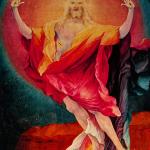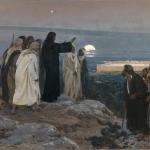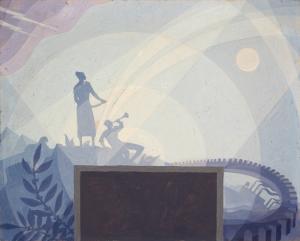
“You need a language with which to express things, which at a certain age you felt you could do yourself, and gradually, somehow, it’s like switching from pastel paint to heavy oils.”[1] Peter Brown wrote these words at the age of eighty-six, having written books in the historical guild since he was in his twenties. I first came across the line while working on my undergraduate capstone, but it has stuck with me through my continuing “journeys of the mind” as a historian. It particularly came to focus my thinking as I was taking a class with David Blight, another remarkable historian, during my Master’s degree. The first assignment for this seminar was to write a personal philosophy of history. I’ve always been interested in historiography—the history of writing history. This opportunity brought me a great question: how does one explain all the internal biases and experiences that shape an approach to the craft and art to which you are devoting at least a portion of your life?
I wrote for Professor Blight (and elsewhere) that “The entire task of the historian might be summed up as the method and process by which she chooses those facts from the past which create a faithful and just narrative of events in such a way as to make sense to contemporary readers.” I still think this is a fundamentally sound definition. I also think the enormity of this task should be immediately obvious. Not only because the greatest historians stand as a rebuke to the more tepid practitioners in our field, but also because there is an intrinsic sense of impossibility. I read a piece by an English professor once that reminded me of this important truth. History is about hospitality. They put it this way.
Questions that are really buried opinions are narcissistic and unproductive. State your opinion, leave it on the table to be debated, picked up and critiqued by your colleagues, and then develop a question out of that opinion. In short, build a bridge between you and your readers and interlocutors; invite them into your thinking, your discipline, your own presumptions. Be a good host[2]
This I think is what one has to inquire when teaching history. How are we good hosts to both ghosts and the living? How do we as one of my professors said “grant a dignity to the people of the past which has so often been refused them;” while paying the same debt to those in our classroom or reading audience? In this post, I want to invite you into how I have wrestled with this question and explain a bit about what I think my philosophy of history is. I want to answer all of these questions by telling you some stories. History is after all, at its best, stories.
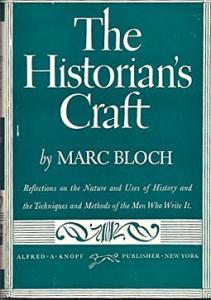 The first story comes from my time in Professor Blight’s class. Despite our seminar being on 19th century US history, he had us read Marc Bloch’s The Historian’s Craft. The story of Bloch writing the book while working in the French Resistance, fully expecting that he would die imminently is one of the great legends of the historians’ guild. Amidst that chaos and uncertainty, in his occupied homeland, he set out to write a book—in response to a question from his son—explaining why history mattered. This may strike some as quite odd. Mightn’t there be something the least bit ridiculous about spending one’s last pen strokes on mere history? And not even history, but a philosophy of history or historiography? I want to discuss this text briefly here not because I think Bloch is unassailable or even correct. Instead, I think his life and the way he wrote The Historian’s Craft form a model of what Edward Said has called the true intellectual: one who pursues their craft not as a profession, working 9-5, but rather for the love of the thing itself. It informs how I understand my own position within the profession.
The first story comes from my time in Professor Blight’s class. Despite our seminar being on 19th century US history, he had us read Marc Bloch’s The Historian’s Craft. The story of Bloch writing the book while working in the French Resistance, fully expecting that he would die imminently is one of the great legends of the historians’ guild. Amidst that chaos and uncertainty, in his occupied homeland, he set out to write a book—in response to a question from his son—explaining why history mattered. This may strike some as quite odd. Mightn’t there be something the least bit ridiculous about spending one’s last pen strokes on mere history? And not even history, but a philosophy of history or historiography? I want to discuss this text briefly here not because I think Bloch is unassailable or even correct. Instead, I think his life and the way he wrote The Historian’s Craft form a model of what Edward Said has called the true intellectual: one who pursues their craft not as a profession, working 9-5, but rather for the love of the thing itself. It informs how I understand my own position within the profession.
Bloch’s father Gustav was an esteemed classical historian who taught at both Lyon and Paris. His childhood and young adulthood were shaped and perhaps even defined by the Dreyfus affair and rising anti-Semitism in France. To gloss briefly, the Dreyfus affair was a great miscarriage of justice involving a Jewish, French military officer. The affair lasted from 1894 (when Marc was 8 years old) until 1906. Alfred Dreyfus was convicted of treason for passing documents to the Prussian Embassy. This occurred after key documents were suppressed by the government proving the spy was a different French officer. To condense a complex story, Dreyfus spent five years imprisoned on an island in South America. Eventually brought back for re-trial amidst mounting evidence of his innocence, Dreyfus was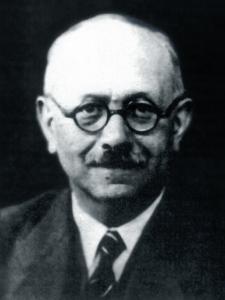 again found guilty, but pardoned and allowed to resume his position in the French army, serving with distinction in WWI. The conflict divided France intellectually between those who supported Dreyfus and the antisemites. This would inform the secular Bloch’s interactions with many friends during the Nazi occupation. Meanwhile, the young Marc went through a typical French education for the time, finishing advanced studies in history just as the First World War broke out. Called into military service, he served honorably and was cited for courage. This experience, as with many men of his generation came to shape how he understood the world and his craft. Soured by the Dreyfus affair, Bloch often sardonically mocked French generals and officers in his diaries and later writings of the war, but showed great respect for the common men of the Army. This was Bloch’s first encounter with what we might call the regular Frenchman. He was incredibly impressed. Indeed, his later medieval work would almost entirely ignore Macauley’s “great men” in favor of focusing on peasants and the lower classes.
again found guilty, but pardoned and allowed to resume his position in the French army, serving with distinction in WWI. The conflict divided France intellectually between those who supported Dreyfus and the antisemites. This would inform the secular Bloch’s interactions with many friends during the Nazi occupation. Meanwhile, the young Marc went through a typical French education for the time, finishing advanced studies in history just as the First World War broke out. Called into military service, he served honorably and was cited for courage. This experience, as with many men of his generation came to shape how he understood the world and his craft. Soured by the Dreyfus affair, Bloch often sardonically mocked French generals and officers in his diaries and later writings of the war, but showed great respect for the common men of the Army. This was Bloch’s first encounter with what we might call the regular Frenchman. He was incredibly impressed. Indeed, his later medieval work would almost entirely ignore Macauley’s “great men” in favor of focusing on peasants and the lower classes.
After the war, Bloch took up a faculty position at the newly French University in Strasbourg. Having passed into German hands after the Franco-Prussian war, the city and university represented an uncanny, liminal space that can be seen as representing much of the scholarly work Bloch pursued. It is clear in his commentaries on both the first and second world wars that Bloch is intrusively aware of the tension between his twin roles as witness and interpreter of the events occurring around him. This tension is maintained in his philosophy of history, which attempts to pragmatically blend romantic, narrative elements with a more positivist, social science influenced historiography. In The Historian’s Craft, he describes the problem this way “Let us guard against stripping our science of its share of poetry. Let us also beware of this inclination, which I have detected in some, to be ashamed of this poetic quality. It would be sheer folly to suppose that history, because it appeals strongly to the emotions, is less capable of satisfying the intellect.” Bloch in both his work and life then begin to give us material from which to fashion what a philosophy or theory of history might be.
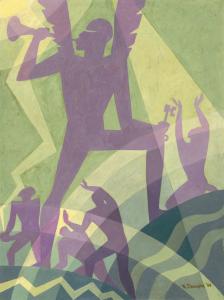
As with the crafts, the arts are most helpfully seen as fields in which one learns by apprenticing to a master artisan.[3]Part of the job of a historian then is, it seems, as a teacher: to instruct their students in how to perform the work of history in a just and right way. But why should a student learn from a historian and not simply teach themselves or learn a set of facts by rote memorization? Why is the historian’s method of choosing which facts to string together any different from a non-historian? This in fact might be why we require a philosophy of history. I believe Arnoldo Momigliano (the earlier mentioned Peter Brown’s mentor) put it best when he argued that without an ahistorical anchor on which to rest or tether our study of the past, we are inevitably susceptible to the charge of a subjectivity akin to that of the adult, white, male slaveholder.[4] What makes a historian’s choice of facts any different from his? My own philosophy, as anyone’s will be, is tinged by my story and that of what southerners might call “my people.”[5] Nevertheless, I believe there is something which separates the professional historian. By definition, none of us were present at the creation—so to speak—of the events we write about. Given this maculate conception of our writings, how do we make sense of why a scholarly historian should be more trusted than a well-read layperson? The teacher’s job is to pass on to their students an ethical methodology for making sense of the past and choosing facts. In this way it is rather like teaching a child how to think rather than what to think. As I think about the reasons for my philosophy of history, I’m drawn to discuss the conversations I used to see on Twitter between professional historians and “informed” laypersons. Given that academic historians have a responsibility to society and humanity to not only hold onto and pass on the past but also to assist in its interpretation, we must take this task seriously. In one such Twitter interaction, I observed a well-known academic historian comment that “A bachelor’s in history makes you a history major. Further professional training can make you a historian.” If we are going to choose such strict—and I believe justified—terms for who can inhabit the field as masters of the craft, we who are members of the guild of historians must take our responsibility seriously.
To make sense of my own philosophy of history requires an understanding of why we study history to begin with. “I believe that humans study history for four baskets of reasons:
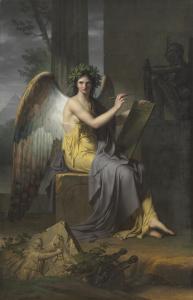
1) To attempt to make different mistakes than our forebearers.
2) To know we are not alone in our strivings and longings and failures and victories.
3) To ensure we are pursuing justice and a just society.
4) To attempt to make sense of our own moment in time and ascertain how we arrived here.”[6]
Given these reasons, my own metahistorical faith and method is grounded in the importance of human dignity. Simply put, my goal is to create dignity for people of the past in a world which does not often grant it to them. This ethic is based in the concept of imago dei or that all human persons have intrinsic worth and value apart from their actions based in a shared humanity as image bearers of their Creator. This human dignity forms the foundation of my methodology for choosing how facts are included and placed in the writing of history. A great lesson of Augustine’s City of God is that we cannot read moral meaning from the facts of history. The Whigs were wrong. As Tolkien put it, “Many that live deserve death. And some that die deserve life.” The balance here is between not simply writing hero myths or bastardizing anyone who I disagree with, but rather as Herodotus often writes to compile what others have said happened in an attempt to give the reader and myself as much of a three-dimensional view of the past as possible. This is my attempt to wrestle with the complexity of history and human nature. Viktor Frankl in his masterful work Man’s Search for Meaning attempts to make sense of this complexity of human behavior when he writes that “Our generation is realistic, for we have come to know man as he really is. After all, man is that being who invented the gas chambers of Auschwitz; however, he is also that being who entered those gas chambers upright, with the Lord’s Prayer or the Shema Yisrael on his lips.”[7] The grounding I seek for my historical writing—regardless of how idealistic it may sound—is to capture the essence of this complexity.
I wonder if we took seriously the golden rule of loving our neighbor what its implications might be for loving our long dead neighbors? Is doing justice to the complexity of their beliefs while still holding them accountable to moral standards of a metahistorical faith possible? I believe it is.
Bloch was executed by the Nazis for his role in the French Resistance. The Historians Craft, ended quite literally mid-sentence. Perhaps, that is part of why he is remembered so strongly in the historical community. The last words of his that we have are from the abrupt end of that text. “For, as soon as we admit that a mental or emotional reaction is not self-explanatory, we are forced in turn, whenever such a reaction occurs, to make a real effort to discover the reasons for it. In a word, in history as elsewhere, the causes cannot be assumed. They are to be looked for…” That finally is what all of us historians do. We are searching to discover a thing which may well be impossible—the reasons, which cannot be assumed, behind the human story.
Of course, nothing I have written here begins to wrestle with the problem of coloniality, the silences of the archives, history of people’s most deeply held beliefs, or a whole host of other problems. How history might answer or study those questions will have to sit with us for the time being and hopefully make us a bit uncomfortable.
[1] Peter Brown, Through the Eye of a Needle – Wealth, the Fall of Rome, and the Making of Christianity in the West, 350-550 AD (Princeton, NJ: Princeton University Press, 2014).
[2] https://avidly.lareviewofbooks.org/2016/09/13/we-arent-here-to-learn-what-we-know-we-already-know/
[3] I am assuming here that history is an art rather than a science or social science. I recognize this is a contentious point. I may defend the position in a future piece.
[4] Momigliano, Arnaldo, and Anthony Grafton. Essays in Ancient and Modern Historiography. Chicago: The University of Chicago Press, 2012. p 369ff “But the moral conscience which requires the historian to do research with a view to better society must be able to resist claims that its values are as historically conditioned as the values of the ruthless adult white male slave-owner. The True answer I believe lies in a dilemma. Either we possess a religious or moral belief independent of history, which allows us to pronounce judgement on historical events, or we must give up moral judging…Even the notion of transforming history by studying history implies a metahistorical faith.”
[5] I think here of Faulkner’s famous line about boys in the South and history: “It’s all now you see. Yesterday won’t be over until tomorrow and tomorrow began ten thousand years ago. For every Southern boy fourteen years old, not once but whenever he wants it, there is the instant when it’s still not yet two o’clock on that July afternoon in 1863, the brigades are in position behind the rail fence, the guns are laid and ready in the woods and the furled flags are already loosened to break out and Pickett himself with his long oiled ringlets and his hat in one hand probably and his sword in the other looking up the hill waiting for Longstreet to give the word and it’s all in the balance, it hasn’t happened yet, it hasn’t even begun yet, it not only hasn’t begun yet but there is still time for it not to begin against that position and those circumstances which made more men than Garnett and Kemper and Armistead and Wilcox look grave yet it’s going to begin, we all know that, we have come too far with too much at stake and that moment doesn’t need even a fourteen-year-old boy to think This time. Maybe this time with all this much to lose than all this much to gain: Pennsylvania, Maryland, the world, the golden dome of Washington itself to crown with desperate and unbelievable victory the desperate gamble, the cast made two years ago; or to anyone who ever sailed a skiff under a quilt sail, the moment in 1492 when somebody thought This is it: the absolute edge of no return, to turn back now and make home or sail irrevocably on and either find land or plunge over the world’s roaring rim.” (Faulkner 2015) This was precisely my experience, and it could be argued the beginning of my almost innate love of history, though I have thankfully grown beyond belief in the lost cause and many other American mythologies.
[6] https://mereorthodoxy.com/historians-behaving-badly
[7] Earlier in the same volume, he writes that “What is demanded of man is not, as some existential philosophers teach, to endure the meaninglessness of life, but rather to bear his incapacity to grasp its unconditional meaningfulness in rational terms.”


